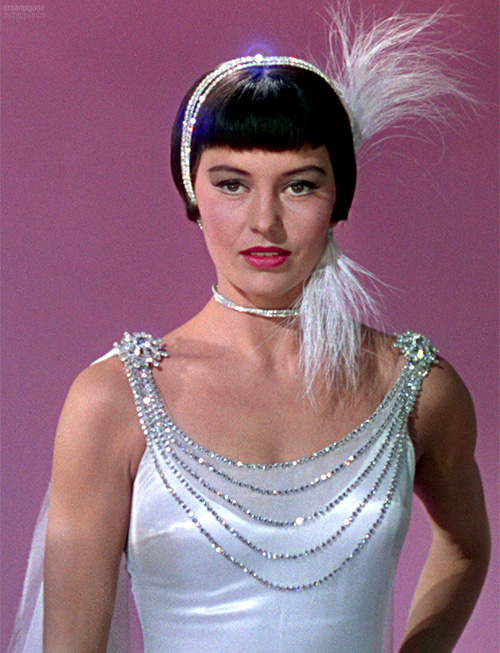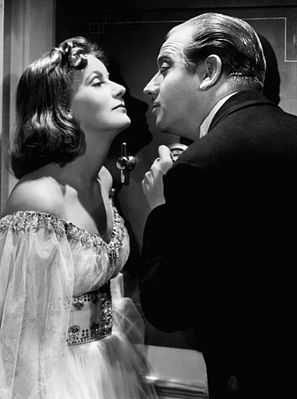It’s Cyd Charisse’s birthday!! (As well as a bunch of other folks; y’all know about the birthday blog, right?) I don’t think one can watch this clip too often.
Kelly, of course, was all about the sex. I watched a documentary, and one of his partners—it may have been Cyd—said that her man always knew when she’d been working with Gene because she’d come home all bruised. Another one (maybe a critic, not a dancer; got to rewatch that thing) said, “You wanted to go to a ballroom with Fred Astaire. You wanted to go straight to bed with Gene.” That’s probably why the first part of this, with the mamba-green dress, works so gorgeously, but the rest doesn’t. There are pretensions to ballet; Kelly would nail this with Lesley Caron in American in Paris, but after that glorious “we’re SO doing it” dance above, to go to some shimmery ethereal thing has an enjoyment interruptus effect. Also, when Charisse comes back in the white flapper outfit, her face looks weird; her eyes are so blank, and the white satin looks, I dunno, like a big Playtex girdle. For her chest.
Charisse has beautiful technique and a thrilling physique, but she’s got to be used right. The idea of remaking Ninotchka as the musical Silk Stockings is a great one, but without Garbo and Lubitsch, it doesn’t work. Garbo is so genius in Ninotchka, just as she is in everything else. You can see her struggling between ideology and fun even as her perfect sculpted face barely moves.
Ninotchka is about an awakening, which, if you’re gonna pull it off right, requires a fine actress. Charisse isn’t one. Even when she takes off her drab Russian dress to reveal a sort of sexy (but mostly prim) white slip, she’s just taking off a dress. In Ninotchka, Garbo sheds her restricting ideology long before she swaps her frumpy frocks for a celestial-themed Adrian gown. Frankly, the dress isn’t especially flattering to her short-waisted figure, but it hardly matters. What a star!
Back to the musical, which never really left us. Honestly, there aren’t that many good ones. Few are shot with any verve or understanding of how to adapt to film, and nearly all the Rogers and Hammerstein ones are awful on film. The French, who have in general a much finer-tuned sense of the absurd, have the verve to be perfectly silly onscreen and make it all come out delicious. Here’s Anna Karina being all sexy in Godard’s love letter to the genre, Une Femme est une femme.
I don’t think 8 Women, a French movie, works especially well, but it tries. It also features Deneuve, Ardant, Huppert, and Darrieux, as well as beauties Emanuelle Béart and Virginie Ledoyen as well as very young Ludovine Sagnier, all of whom appear to be having a ball. Jump to the clip for a sweet soupçon.

Of course, the French—oui, je suis un “phile”—are so unafraid to be eccentric. The only sung-through musical that’s ever worked is this one, The Umbrellas of Cherbourg, in which a guy starts off singing about a need for petrol and it’s utterly charmant. This clip is pretty poor quality but at least provides a taste. So stream the whole thing stat!
Evita didn’t fare as well, but at least had some spectacular moments, nearly all of which featured Antonio Banderas. I worked on the Criterion (laserdisc!) edition of this, and have tremendous respect for Alan Parker; it’s uneven material and he ran pretty hard with it (he’s a cool guy who you want to hang out with in a pub). Darius Khondji’s photography and Gerry Hambling’s editing are rock solid throughout. The guy in the red tie with the silver hair and gorgeous voice is none other than the great Gary Brooker of Procol Harum.
And then there’s Les Mis. I’m sorry. I think this is a lame musical. I think the music is awful, overblown, pretty for a measure or two then histrionic, then just silly. I haven’t seen the movie, but I did pop in for about 5 minutes when I was done seeing something else. It looked gorgeous, but the music is like freaking windshield wipers after a while.
Then there’s 9. First off, the musical utterly misses the point. “9” is just a number, not a statement on ambiguity and uncertainty, like Fellini’s 8 1/2, on which it’s based. Still, adding songs to illustrate a man’s journey through the women in his life isn’t a bad idea; it’s just too bad that the songs all kind of, well, suck. The real problem here is Rob Marshall’s direction. Trying so hard to be Bob Fosse you sense him walking pigeon-toed behind the scenes, he doesn’t have Fosse’s uncanny ability to choreograph a camera even more sinuously and subtly than he plotted dancers’ movements; he frames too tight. He also doesn’t have a smidgen of Fosse’s incomparable musicality. Here’s one of the more mesmerizing numbers; very polarizing, and you may hate it or love it, but Kate Hudson does seem to have a ball and gives her mom’s bikini go-go Laugh-In days a run for the money.
Now, here’s Fosse. I rest my case.
I loved that Woody Allen attempted a new take on the musical with Everyone Says I Love You. I just wish it wasn’t so horrible.
And Julia Roberts has never sung again, at least on film. Huzzah.
But I LOVED Dreamgirls. Wonderfully shot, edited, and played. And seriously, Jennifer Hudson was just as gorgeous pre-Weight Watchers as post.
Meanwhile, however I search, not much is coming about any musicals slated for production. PLEASE let me know in the comments if you know of any coming up.



